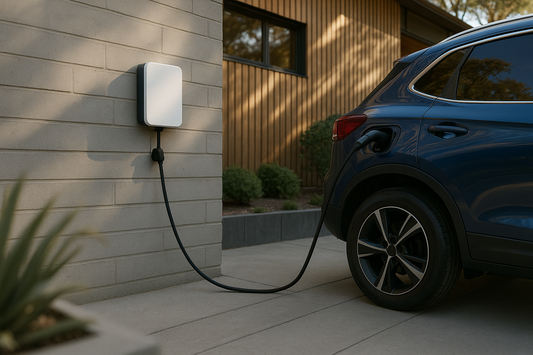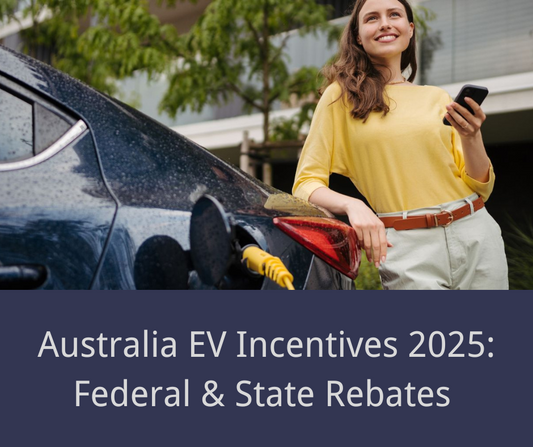The Trends of the Australian EV Market
In May 2024 the vehicle (EV) market, in Australia experienced growth following an ongoing trend seen throughout the year. As reported by the Federal Chamber of Automotive Industries (FCAI) EV sales saw a 10% increase from April to May reaching a total of 4,200 units sold in May. This surge signifies a rise compared to the 3,000 units sold in January 2024. The consistent upward trajectory of EV sales showing a spike of 40% over the five months of the year reflects a broader shift among consumers towards more sustainable transportation choices. This uptrend is fueled by factors including availability of models government incentives and heightened environmental consciousness. The pattern highlights the increasing acceptance and uptake of EVs nationwide.

For insights and detailed data on sales records and the continuous growth witnessed in May 2024 you may refer to FCAIs report, on Automotive Sales Records.
The Top 10 Sales EV Models in Australia for May 2024
Here are the latest insights, from sources on the 10 best selling electric vehicles (EVs) currently in demand in Australia for May 2024:
1. Tesla Model Y - Continuing its presence as a leader in the EV market with impressive sales figures.
2. BYD Atto 3 - Maintaining popularity and standing out as an option among consumers.
3. Tesla Model 3 - Consistently performing well and remaining a choice in the EV market.
4. Polestar 2 - Attracting attention with its design and performance capabilities.
5. MG ZS EV - Providing an affordable EV option that appeals to a range of buyers.
6. Kia EV6 - Known for its design and advanced technological features.
7. Volvo C40 Recharge - Impressing customers with its feel and electric efficiency.
8. Hyundai Ioniq 5 - A favorite for its design and practical functionalities.
9. Cupra Born - Making a debut in the EV market scene.
10. Mercedes Benz EQB - Offering a mix of luxury elements and strong electric performance.

These rankings highlight the growing popularity and diverse choices of EVs available in Australia, driven by factors like government incentives, increased model availability and heightened environmental consciousness, among buyers.
Notable News in the Australian EV Market in May 2024
1. National Electric Vehicle Strategy Implementation
The Australian Government launched its National Electric Vehicle Strategy in May 2024, marking a significant milestone in the country's transition towards greener transportation. This comprehensive strategy focuses on increasing EV affordability, expanding charging infrastructure, and reducing emissions. Key initiatives include setting national standards for EVs, enhancing data sharing among stakeholders, and promoting EV education and awareness (Energy.gov.au).

2. Electrification of Logistics Fleet by Team Global Express
Team Global Express, an Australian logistics giant, announced an ambitious plan to add 300 electric trucks, vans, and mobile chargers to its fleet. This initiative follows the establishment of Australia's first fully electrified last-mile delivery depot, supported by the Clean Energy Finance Corporation. The move is part of the company's broader sustainability strategy, aiming to reduce its carbon footprint and promote cleaner logistics operations (The Driven). The electrification of the fleet is expected to significantly cut down on greenhouse gas emissions, contributing to the national goal of net-zero emissions by 2050.

3. Battery Passport Technology by Volvo
Volvo introduced a 'battery passport' for its 2025 EX90 model ahead of the 2027 European mandate, setting a new standard for transparency and sustainability in the EV industry. The battery passport aims to enhance traceability, allowing consumers to access detailed information about the battery's lifecycle, including its production, usage, and recycling (CarsGuide). This innovation is part of Volvo's commitment to sustainability and responsible sourcing of materials, addressing concerns about the environmental impact of battery production and disposal.

4. Expansion of EV Charging Network by Tesla
Tesla announced upgrades to its Supercharger network across Australia, introducing new V4 Superchargers. These upgrades are designed to accommodate a wider range of EVs, not just Tesla models, thus supporting the broader EV ecosystem. The new Superchargers offer faster charging times and greater convenience, addressing one of the main barriers to EV adoption: the availability of reliable and fast charging infrastructure (The Driven). Tesla's initiative is expected to accelerate the transition to electric mobility by making long-distance travel more feasible for EV owners.

5. BYD's Expansion Plans
BYD confirmed the introduction of the Seal U electric mid-size SUV to the Australian market in 2024. This model will join BYD's growing lineup, including the Atto 3, Dolphin, and Seal, as part of the company's strategy to launch at least two new models annually in Australia. The Seal U is expected to offer competitive pricing and advanced features, appealing to a wide range of consumers. BYD's aggressive expansion plan underscores its commitment to establishing a strong presence in the Australian EV market (Drive).

6. Toyota's Hybrid-Only Lineup
Toyota Australia has chosen to discontinue petrol engines in favor of hybrid models, for the Corolla Cross, RAV4 and Kluger SUVs. This change aligns with Toyotas goal of reducing emissions and complying with regulations. The shift to a hybrid lineup is anticipated to deliver fuel efficiency and reduced emissions catering to eco conscious buyers. Toyotas choice mirrors the industrys move towards electrification and the increasing desire among consumers, for transportation choices (CarsGuide).

7. UN's Call for Fossil Fuel Advertising Ban
The UN Secretary General, António Guterres has made an statement by urging a worldwide prohibition, on advertising for fossil fuels. He referred to the industry as the "instigators of disorder" due to their contribution to impeding climate action. This declaration carries weight in shaping policies and public opinions on fuels and the adoption of electric vehicles. The push for this ban is part of an initiative aimed at diminishing the influence of the fossil fuel sector and encouraging energy options. It underscores the pressing need to tackle climate change. Emphasizes the role that sustainable transportation plays, in meeting global environmental objectives (The Driven).
8. Government Support for EV Charging in Remote Areas
The governments plan for vehicle (EV) development focuses on improving charging facilities in remote and rural regions. This effort is geared towards making EV ownership viable, beyond city areas. The scarcity of charging stations in locations has been an obstacle to EV acceptance particularly for those considering long journeys. By tackling this challenge the government aims to motivate Australians to embrace vehicles aiding the shift, towards a greener transportation network (Energy.gov.au).

Conclusion
May 2024 has proven to be a month, for the vehicle (EV) sector in Australia showcasing notable trends, sales data and impactful news. The rising sales of EVs the introduction of the National Electric Vehicle Strategy and various efforts from government and private sectors emphasize the fast changing nature of the EV industry in Australia. These developments, in May 2024 highlight the importance of collaboration, innovation and dedication to objectives as Australia steers towards a sustainable future. With consumer interest, technological progress and supportive policies driving it forward the Australian EV market is set for growth.



